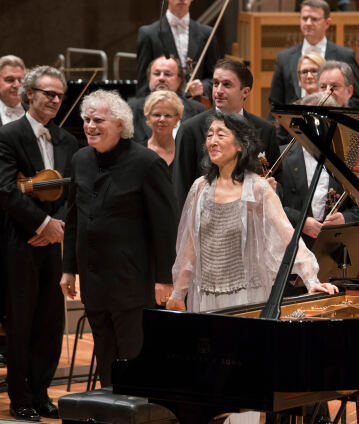Simon Rattle with Mitsuko Uchida and Amihai Grosz

Delicate melancholy and lyrical sensuousness characterise the two solo concertos on this programme with Simon Rattle, Mitsuko Uchida and Amihai Grosz. Wolfgang Amadeus Mozart seems to reflect on his life in his last piano concerto, while William Walton’s Viola Concerto is dominated by the dark tone of the solo instrument. As a counterpoint, the concert closes with Zoltán Kodály’s humorously grotesque Háry János Suite.
“I have the impression that every note in Mozart’s music behaves like a toddler – totally unpredictably,” Mitsuko Uchida once admitted in an interview. She ought to know, after all, the pianist, who was born in Japan and grew up in Vienna, is a specialist in the music of the First Viennese School – something she has convinced Berliner Philharmoniker audiences of on many occasions over the more than 30 years that she has worked together with the orchestra. This season, she performs Mozart’s B-flat major Piano Concerto K. 595, his final work in the form. It is characterised by the simple but, as it were, concentrated treatment of the musical material and its reflective, serene tenor. The cheerful closing theme of the final movement, which includes the song “Come, dear May, and make” was to become hugely popular.
The programme also includes another instrumental concerto: William Walton’s Viola Concerto. The English composer wrote the work in 1929 for the famous violist Lionel Tertis who nevertheless rejected the piece, much to Walton’s great disappointment. Later, the musician was ashamed of himself for doing so. He regretted not having immediately recognised the beauty and modernity of the piece. The premiere was then played by another musician, Walton’s German colleague Paul Hindemith who was himself a professional violist. In these concerts under the direction of Sir Simon Rattle, the soloist is Amihai Grosz, who has been first principal viola with the Berliner Philharmoniker since 2010.
The concert closes with Zoltán Kodály’s Háry János Suite which the Hungarian composer compiled from six movements of the Singspiel of the same name. János Háry, a war veteran of the Napoleonic wars – comparable with the German Baron Munchausen, renowned for his tall tales – recounts his incredible adventures. “The grotesque figments of his imagination are a wonderful mixture of realism and naivety, comedy and pathos,” remarked Kodály. The composer set the fantastic adventures to music with wit, irony and charm, conjures up a bizarre battle music and a comic funeral march, and quotes Hungarian folk music and Viennese military bands. This special blend is what makes the work so successful: For the first time, Kodály confronted the urban concert audience with the original music of the rural population. Although one critic railed that the piece filled the air with the “whiff of an ethnographic museum”, the suite significantly contributed to the international fame of the composer.
© 2017 Berlin Phil Media GmbH
Related interviews
Artists
Our recommendations
- Simon Rattle conducts Mozart and Strauss at the 2006 New Year’s Eve Concert
- Simon Rattle conducts Mozart and Haydn in Lucerne
- “Late Night”: A Klezmer evening
- Anniversary concert “50 years of the Berlin Philharmonie”
- Simon Rattle and Mitsuko Uchida
- Matthias Pintscher conducts Ligeti, Zimmermann and Martinů